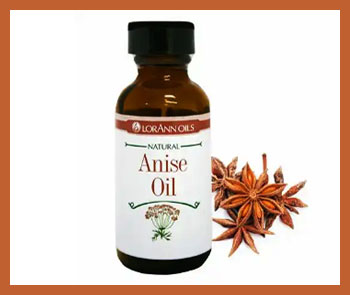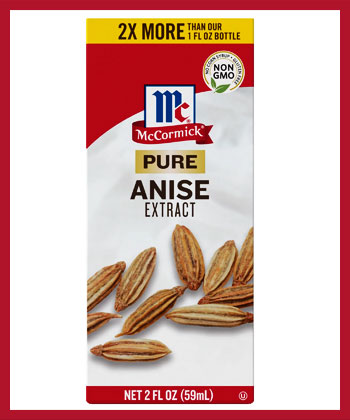Anise oil and anise extract both impart the distinctive licorice-like flavor of anise to foods, beverages, and other products. But what exactly is the difference between these two popular ingredients?
In this comprehensive guide, we’ll compare anise oil and anise extract side-by-side, looking at their origins, chemical composition, uses, flavors, and more. We’ll also overview the pros and cons of each to help you determine which is better for your needs.
A Brief Comparison Table
| Category | Anise Oil | Anise Extract |
| Source | Anise seeds | Anise seeds |
| Extraction Method | Steam distillation | Alcohol extraction |
| Main Flavor Compounds | Anethole, estragole | Anethole, estragole |
| Flavor Profile | Potent, concentrated licorice | Milder, well-rounded licorice |
| Uses | Fragrance, aromatherapy, flavoring | Baking, cooking, candy |
| Shelf Life | 1-3 years | 2-3 years |
| Price | More expensive | Less expensive |
Overview of Anise Oil
Anise oil is a potent essential oil derived from the seeds of the anise plant. Here are some key facts about anise oil:

- Extraction Method: Anise oil is extracted via steam distillation. Anise seeds are placed in a still and pressurized steam forces the oils out of the seeds and condenses them into a concentrated liquid.
- Chemical Composition: The main active compound in anise oil is anethole, which makes up 80-90% of the oil. It also contains estragole, anise ketone, and other compounds that contribute to its aroma and flavor.
- Flavor Profile: Anise oil has a very concentrated, licorice-forward flavor profile. It provides a bold hit of sweet, aromatic, spicy anise flavor. The flavor is intense and powerful.
- Common Uses: Anise oil is popular for aromatherapy, skin care, soaps, perfumes, and as a flavoring in licorice candies and liqueurs. A little goes a long way due to its concentrated nature.
- Comparative Flavor Strength: Anise oil is much more potent and intense in flavor compared to anise extract. A few drops can provide as much flavor as a teaspoon of extract.
Overview of Anise Extract
Anise extract is made by infusing anise seeds in alcohol, usually ethanol. Here are some characteristics of anise extract:
- Extraction Method: Anise seeds are soaked in a high-proof alcohol like vodka or grain alcohol. The alcohol slowly extracts the oils and flavors from the seeds.
- Chemical Composition: Like the oil, anethole is the predominant flavor compound in anise extract. However, the alcohol also extracts other subtly flavored compounds.
- Flavor Profile: Anise extract has a milder, more balanced licorice flavor than the essential oil. It tastes more rounded with extra subtle notes.
- Common Uses: Anise extract is very popular in baking for flavoring cookies, cakes, pastries, and breads. It’s also used for making ouzo and other anise-flavored liquors.
- Comparative Flavor Strength: Anise extract provides a much milder level of anise flavor than the concentrated essential oil. More can be used to achieve the desired licorice taste.
Also Read: Comparison Between Sports Research and Bulletproof Oils
Key Differences Between Anise Oil and Anise Extract
While anise oil and extract share similarities, there are some notable differences between these two products:
1. Concentration

Anise oil and anise extract are both made from the same plant, but they are very different when it comes to their concentration. Anise oil is way more concentrated than the extract.
This means that you only need a tiny bit of anise oil to get the same flavor that you would get from a larger amount of anise extract. It’s like comparing a super-strong cup of coffee to a regular one – the oil is much more powerful!
2. Flavor Balance
The flavor of these two products is also quite different. Anise extract has alcohol in it, which helps to pull out a more balanced and rounded flavor from the anise plant.
This means that when you taste anise extract, you get a mix of different flavors that are all working together. On the other hand, anise oil has a very strong anise flavor, which might be a bit too much for some people if not balanced correctly.
3. Shelf Life
Shelf life is another important difference. This is the length of time that food can be stored before it goes bad.
Anise oil can last between 1 to 3 years if it’s not opened, while anise extract has a slightly longer shelf life, lasting between 2 to 3 years unopened. This means that if you’re planning on using them for a long time, the extract might be the better option.
4. Price
When you go to the store, you might notice that anise oil is generally more expensive than anise extract, ounce for ounce.
This is because it takes a lot more anise plant material to make the oil compared to the extract. It’s a bit like buying a luxury car versus a regular car – the luxury car (or the anise oil) costs more because it’s made with more expensive materials.
5. Heating
If you’re planning on cooking with anise oil or extract, it’s good to know how they react to heat. Anise oil can degrade, or break down, when it’s heated.
This means that if you’re baking or cooking with it, the flavor might not be as strong. Anise extract, however, holds up really well when heated, so it’s a better choice if you’re planning on using it in hot dishes.
6. Best Uses
Given their differences, anise oil and anise extract are best suited for different uses. The strong and concentrated flavor of anise oil makes it great for things like aromatherapy, skincare, and making perfumes.
Imagine breathing in the strong scent of anise oil during a relaxing massage, or using it to make a lovely-smelling perfume!
On the other hand, anise extract, with its balanced flavor and heat resistance, is preferred for cooking and making beverages. It’s a popular ingredient in cookies, cakes, and even some drinks!
7. Availability and Accessibility
While both anise oil and anise extract are derived from the same plant, their availability can differ depending on where you are.
Anise oil, being more specialized and expensive, might be a little harder to find in regular grocery stores compared to anise extract, which is commonly used in cooking and thus more widely available.
8. Health Benefits and Risks
Both anise oil and anise extract have been associated with several health benefits, such as aiding digestion and reducing inflammation.
However, due to the higher concentration of anise oil, it is also associated with a higher risk if consumed in excess. It is essential to use it sparingly and be aware of any possible allergic reactions or interactions with medications.
9. Culinary Applications
In the culinary world, the choice between anise oil and anise extract can greatly affect the outcome of a dish. Anise extract, being less concentrated and more heat-stable, is often favored for baking and cooking, adding a subtle licorice flavor to dishes.
In contrast, anise oil, due to its potency, is used more sparingly and often in non-heated applications like salad dressings or as a finishing touch.
10. Packaging and Storage
Anise oil and anise extract come in different types of packaging due to their differing consistencies and uses. Anise oil is typically found in smaller bottles with droppers for precise measurement, while anise extract is usually in larger bottles, similar to vanilla extract.
Proper storage is crucial for both; they should be kept in cool, dark places to preserve their flavor and extend their shelf life.
11. Labeling and Regulation
Anise oil and anise extract are subject to different labeling and regulation standards. Given that anise oil is often used for therapeutic and cosmetic purposes, it may have stricter labeling requirements, including warnings about proper usage and dosage.
Anise extract, predominantly a culinary ingredient, adheres to food labeling standards, with emphasis on nutritional information and allergen warnings.
12. Consumer Preference
Different people might prefer one over the other depending on their needs and taste preferences. Some might favor the intense, singular flavor of anise oil for specific applications, while others might prefer the more rounded and balanced flavor profile of anise extract for culinary uses.
Also Watch This Video:
Pros and Cons of Anise Oil
Pros:
- Intense, concentrated anise flavor
- Little goes a long way
- Shelf-stable for 1-3 years
- High in anethole content
- Versatile aromatherapy oil
Cons:
- Very potent; takes precision when measuring
- Not heat stable; can’t use in baked goods
- More expensive than anise extract
- Flavor can be one-dimensional
Pros and Cons of Anise Extract
Pros:
- Milder, rounded anise flavor
- Works well in baked goods and drinks
- Budget-friendly compared to anise oil
- Provides balanced, nuanced flavor
- Can stand up to heat
Cons:
- Flavor not as bold or intense as anise oil
- Shelf life slightly shorter than anise oil
- May contain traces of alcohol
- Can have subtle bitter notes
Also Read: Comparison Arctic Ruby Oil and Krill Oil
Frequently Asked Questions (FAQs)
Yes, you can substitute anise oil for anise extract in recipes, but adjustments are needed. Use 1/4 teaspoon of anise oil for every 1 teaspoon of extract. The flavor will be much more pronounced.
Anise seed is the dried seed of the anise plant used as a spice. Anise extract is made by soaking anise seeds in alcohol to extract the essential oils and flavors. Extract has a more balanced, mellow taste.
Yes, anise oil and aniseed oil are names for the same essential oil product made from the seeds of the anise plant. They have the same chemical composition and flavor profile.
Anise extract is widely used to provide licorice flavoring to baked goods, beverages, candies, pharmaceuticals, and liquors like ouzo. A small amount imparts a nice anise taste.
Final Thoughts
Both anise oil and anise extract can add delightful licorice notes to your recipes and products. Anise oil shines when you want an intense, bold anise flavor for aromatherapy, perfumes, and some candies.
Anise extract offers a more balanced, nuanced, and cooking-friendly licorice flavor that excels in all kinds of baked goods, drinks, and sweets.
Consider your intended use and flavor needs when deciding between these two popular anise flavoring ingredients. A little trial and error can help you figure out the precise amounts to use.

